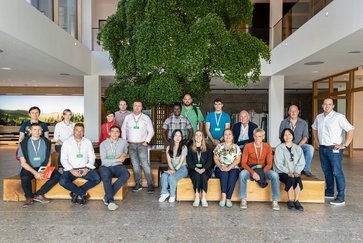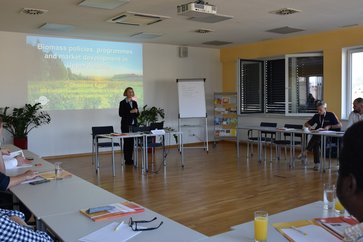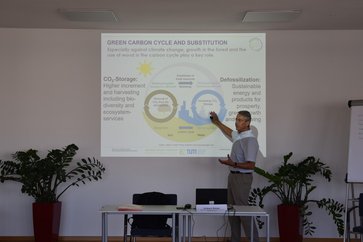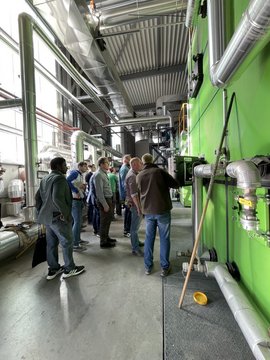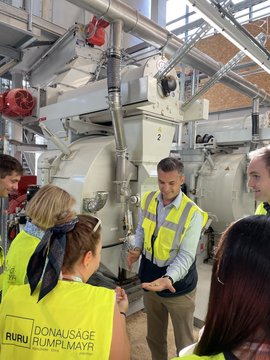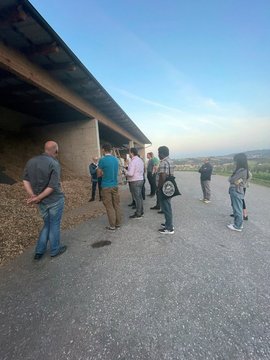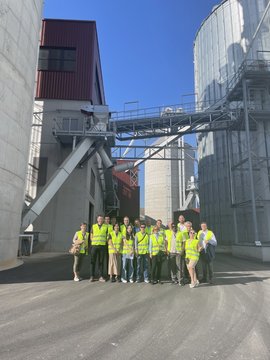2 - 5 October 2023
Linz/Austria
The price crisis, multiplying signs of climate change, and threats to energy security urge us to act like never before. As a CO2-neutral fuel, sustainable bioenergy is a key component in decarbonising and securing our energy supply. Market transformation towards modern, efficient and low-emission bioheat systems offers significant opportunities for affordable and local energy supply as well as climate and environment protection.
The international training seminar on bioenergy heating was organised by the Energy Academy of the OÖ Energiesparverband and took place from 2 – 5 October 2023 in Linz, Austria. The programme focused on small- to mid-scale projects fuelled by wood pellets and wood chips. It covered solutions for homes, smaller commercial/public buildings and district heating grids (up to a few MW).
The seminar offered interactive learning in an international group of 16 participants from 12 countries, including educational site visits and presentations by experts in bioenergy technologies, market development and the sustainability of bioenergy.
During 3 densely-filled days the participants received technical "classroom" training sessions on bioenergy policies, programmes and market development in Upper Austria, sustainability of bioenergy and combustion technologies for low emissions & high efficiencies.
In addition, the seminar offered the opportunity to see the whole bioheat supply chain in action. During site visits throughout Upper Austria, the participants visited a pellet production and the production facilities of bioenergy boiler manufacturers. The excursions were complemented with presentations on examples of system designs, challenges in young markets and marketing of bioenergy boilers. The international group could observe the pellet distribution chain until the heating system in a single-family home, the solar drying of wood chips and bioenergy microgrid as well as a range of different plants in operation. They visited different ESCO-operated bioenergy heating facilities and received an insight into the financing and operation model "Contracting". Additional on-site trainings took place in a bioenergy district heating installation and a bioenergy cogeneration plant.
The participants gave very positive feedback about the seminar and enjoyed their stay in Upper Austria.
Date
2 - 5 October 2023
(Start: 2 October, 17.30; End: 5 October, 18.00)
Language
The training seminar was held in English.
Fees
960 Euro (plus 10 % VAT)
630 Euro (plus 10 % VAT) for public administrations & energy agencies
Fees include the training sessions and documentation, site visits and coffee breaks/meals.
Accommodation in nearby hotels in Linz costs about 120-150 Euro/night (including breakfast and taxes) and is not included in the seminar fees.
Organisation & venue
OÖ Energiesparverband, Energy Academy, Landstrasse 45, 4020 Linz/Austria,
T: +43-732-7720-14386, office@esv.or.at
2 October
Arrival, introduction and welcome dinner
3 October
Technical training sessions
Technical site visits
4 October
Technical training sessions
Technical site visits
5 October
Technical site visits
Upper Austria is one of Austria’s nine federal states/regions and has a population of 1.5 million. It holds a leading position in bioheat: 17 % of primary energy comes from sustainable biomass, 37 % of dwellings are heated with clean bioenergy and there are over 6,000 jobs in the bioheat industry. Upper Austria has one of the highest densities of small-scale automatic bioenergy heating systems in the world.
The region has given political priority to energy efficiency and renewable energy since the mid-90s. Renewables currently cover 33 % of the region’s primary energy demand: 16 % bioenergy, 11 % hydropower, and 6 % solar and other renewable energy sources. 60 % of all space heating already comes from renewable and waste heat. Strategic decision-making and comprehensive actions in sustainable energy policies have resulted in high-performing markets for clean heating. Bioenergy is an important economic driver for the region and plays a key role in the region’s ambitions for achieving climate neutrality. Over 1 billion Euro per year are invested in biomass fuels and equipment.
The International Training Seminar is organised by the Energy Academy of the OÖ Energiesparverband, the regional energy agency of Upper Austria.
OÖ Energiesparverband drives the energy transition by promoting energy efficiency, renewable energy, e-mobility and innovative energy technologies. It provides comprehensive services to citizens, municipalities and businesses of all sizes. It carries out over 10,000 face-to-face energy advice sessions each year. It also supports energy technology companies in the Cleantech-Cluster.
In the context of its Energy Academy, OÖ Energiesparverband holds over 30 training courses with more than 1,000 participants each year. It is also the organiser of the European Pellet Conference, the world's largest annual event on wood pellets.
The Cleantech-Cluster (CTC) is the platform for energy and environmental technology companies in Upper Austria. It supports innovation, competitiveness and visibility of its more than 250 partner companies. It contributes to market growth across the entire value chains in the fields of sustainable energy and environmental technologies. In the energy technology sector, partner companies employ over 7,000 people and achieve a combined annual turnover of more than 2.5 billion Euro. More than 25 % of all modern small-scale bioenergy boilers installed in the EU are manufactured by Upper Austrian companies and pellet heating systems have become a standard solution in the region.
According to the IEA, forest bioenergy is an important part of sustainable energy provision in Europe, particularly for heat production. It is therefore a key piece of the energy transition and energy security. Over 90 % of biomass used for energy comes from European resources. Sustainably managed forests continue to absorb carbon from the atmosphere. In addition to timber or pulpwood, they provide important amounts of low quality wood resources and residues that can be used for energy. No forests have to be cut down for it.
The development of the bioheat market in Austria stands on three quality pillars:
Bioenergy comes from CO2-neutral and sustainable fuels (mostly pellets and wood chips) produced from residues from sustainable forestry and byproducts from the wood industry. The quality and convenience of modern, fully automated, ultra-low emission heating equipment generate consumer trust. Strict criteria ensure that only highly efficient technologies are installed.
Linz is the third largest city of Austria and the capital of the region of Upper Austria (Oberösterreich). It is located in the north of Austria, on both sides of the Danube river. The city has a population of 211,000. Named the "Cultural Capital of Europe" in 2009, Linz combines an industrial heritage with modern cultural highlights (e.g. Ars Electronica Center, Lentos Art Museum, modern opera house etc.).
"All fields of bioheat were covered and were explained with concrete examples."
"I very much appreciated the practical orientation of the seminar."
"The technical sessions and site visits were well balanced."
"The seminar was outstanding: well-designed, broad in scope and informative."
"All speakers showed enthusiasm for their subject and the level of technical details was excellent."
"I will recommend the seminar to others in the future."
"It was one of the most interesting trainings I have ever participated in. The hosts were excellent, and I especially appreciated the attention paid to providing us with a nice atmosphere.”
How to reach us
